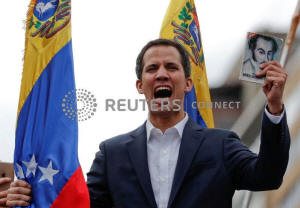|
As world looks on, Venezuela's Guaido to
keep up pressure on Maduro
 Send a link to a friend
Send a link to a friend
 [January 24, 2019]
By Brian Ellsworth [January 24, 2019]
By Brian Ellsworth
CARACAS (Reuters) - Venezuela's opposition
will on Thursday seek to maintain pressure on isolated President Nicolas
Maduro after congress chief Juan Guaido swore himself in as interim head
of state with the support of nations around the region.
Guaido won diplomatic backing from the United States, Canada and
right-leaning Latin American governments on Wednesday after declaring
himself leader before ebullient supporters who thronged the streets of
Caracas in hopes of change.
The European Union said the democratic will of Venezuelans "cannot be
ignored" and called for the "civil rights, freedom and safety" of Guaido
to be respected, but stopped short of recognizing him as leader.
The 35-year-old industrial engineer, catapulted almost overnight to
national leader, has promised free and fair elections, a transition
government to revive the hyperinflation-riddled economy and an amnesty
for military officers if they help push Maduro from power.

He faces the daunting task of pushing forward the transition plan
without control over crucial state institutions and armed forces that
have disavowed him.
Military commanders, including Defense Minister Vladimir Padrino, have
so far promised to stick with socialist Maduro.
Russia, which has invested heavily in Venezuela's oil industry and
provided support to its armed forces, warned Washington against military
intervention and said it would protect the country's sovereignty.
Deputy Foreign Minister Sergei Ryabkov told Russian journal
International Affairs that Moscow would defend the principle of
non-interference in Venezuela's affairs. He did not mention Maduro by
name, but made clear Moscow backed his government.
Turkey took a similar line, with President Tayyip Erdogan calling Maduro
to offer support.
Among investors holding defaulted debt issued by the government and
state-run oil company PDVSA, the political developments fueled hopes
that a resolution of the crisis might be coming closer.
Sovereign dollar and PDVSA <PDVSA.UL> bonds extended gains early on
Thursday, having surged the previous day after Washington backed Guaido.
'THE RIGHT TO CHOOSE'
Many opposition sympathizers are concerned Guaido could be arrested like
other political activists, including his mentor Leopoldo Lopez, who
remains under house arrest for his involvement in street protests in
2014.
[to top of second column]
|

Juan Guaido, President of Venezuela's National Assembly, holds a
copy of Venezuelan constitution during a rally against Venezuelan
President Nicolas Maduro's government and to commemorate the 61st
anniversary of the end of the dictatorship of Marcos Perez Jimenez
in Caracas, Venezuela January 23, 2019. REUTERS/Carlos Garcia
Rawlins

"While it's true that Guaido has been recognized internationally,
the real power of the state is still in the hands of Nicolas Maduro,"
said Ronal Rodriguez, a political science professor who focuses on
Venezuela at Rosario University in Bogota.
With the country's economy falling apart and annual inflation
approaching 2 million percent, Maduro has relied extensively on the
military to maintain power.
Foreign backing could allow Guaido to raise funds abroad to obtain
food and medicine for a population struggling under economic crisis,
Rodriguez said, but he would face challenges in getting goods
through ports controlled by Maduro allies.
Guaido on Wednesday promised that humanitarian aid would be
distributed with the oversight of congress.
He did not announce activities for the coming days.
Referring to Wednesday's anti-government protests, the EU said
Venezuela's people had "massively called for democracy and the
possibility to freely determine their own destiny. These voices
cannot be ignored.
"The Venezuelan people have the right to peacefully demonstrate, to
freely choose its leaders and decide its future," the 28-nation bloc
said in a statement.
The EU has imposed sanctions on Venezuela and boycotted Maduro's
swearing-in for a second term this month following a
widely-boycotted election last year that many foreign governments
called a sham.
It aims to set up an international contact group with South American
nations in February to seek talks between Maduro and the opposition,
which diplomats said would need to include Guaido.
European Council President Donald Tusk, who coordinates EU
governments from Brussels, took to Twitter to call on "all of Europe
to unite in support of democratic forces" in Venezuela.

(Additional reporting by Robin Emmott in Brussels, Karin Strohecker
in London and Maria Kiselyova in Moscow; Editing by Rosalba O'Brien
and John Stonestreet)
[© 2019 Thomson Reuters. All rights
reserved.]
Copyright 2019 Reuters. All rights reserved. This material may not be published,
broadcast, rewritten or redistributed.
Thompson Reuters is solely responsible for this content. |